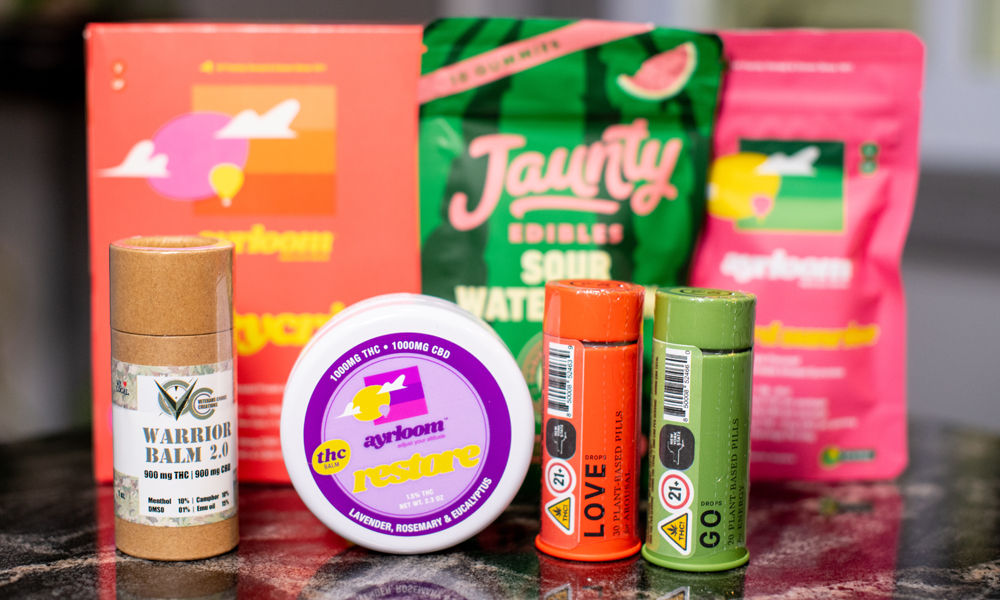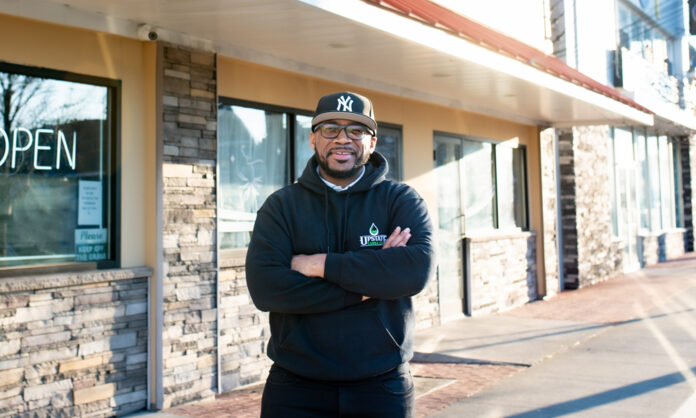While New York State legalized recreational cannabis in 2021, it would be a long way out before Capital Regionites could visit a dispensary in their own community. For many connoisseurs, buying legal cannabis meant traveling out of state to Massachusetts, or making a stop while down in New York City. One savvy business owner, however, was determined to make a Capital Region outpost happen, playing the long game from the get-go.
When Schenectady’s Don Andrews opened Upstate CBD in 2019, he was already thinking ahead. While the smoke shop focused on CBD and hemp products, it was important to Andrews that customers’ experiences in the smoke shop mirror a dispensary as much as possible—even though he wasn’t yet selling cannabis.

“I set up that place as if it was a dispensary to gear up and get ready for when New York State legalized,” says Andrews, who took inspiration for his shop from his travels to places such as Colorado and California, two states that had early legalization, and the notorious coffee shops that sell cannabis across the pond in Amsterdam. When New York State business owners could finally apply for a dispensary license, Andrews drew upon his strong foundation and was quick to mobilize. Now, Upstate CBD is known as Upstate Canna Co.—the first legal dispensary to open in New York State’s Capital Region.
After Upstate Canna Co. opened its doors on April 1, 2023, the dispensary quickly became known for its impressive selections of flower, edibles, concentrates and topicals—and the fact that its cannabis is locally grown. Unlike the cannabis one would find outside of a legal dispensary, Upstate Canna Co.’s products are lab-tested, ensuring safety and quality. Andrews explains that having this peace of mind is important to his customers.
For Jen Rodgers, an Upstate Canna Co. shopper, the dispensary has been a resource for accessing cannabis products that support her overall health and wellness—as well as her relaxation. As someone who deals with insomnia, she’s been glad to find relief through natural products. “If you’re an overthinker, it helps put you in a peaceful mood, have a nice evening and sleep,” says Rodgers, who has some words of wisdom for the many folks who are coming to cannabis for the first time now that dispensaries are popping up in our region. “What I always tell my friends, or anybody who’s interested, is: You don’t want to play around and try a bunch of different things. Just find something that works for you and stick with it.”

For some, this may mean THC and CBD tinctures for managing pain, or even THC seltzers as a stand-in for alcoholic drinks. For others, it may mean choosing from a selection of locally grown flower, trying healing THC lip balms for winter-chapped lips, or finding the right vegan gummy for welcoming dreamland.
“There’s so much product out there,” says Andrews. “There aren’t enough stores.”
While that may sound like hyperbole, it isn’t, due to the rocky start that legalized cannabis has suffered in New York State. While the process for business owners to obtain their licenses has been slow on the uptake, many farmers were able to convert their farms to grow cannabis much more quickly. With not enough brick-and-mortar dispensaries open to legally sell their crops, many farmers have watched their investments turn to rot.
That’s why Andrews partnered up with Scot Trifilo—of Ten-Ten Cannabis—for last fall’s Saratoga Cannabis Growers Showcase, where cannabis growers, cultivators, processors and retail dispensaries came together to sell their products in a marketplace setting, a short-term compromise between New York State and cannabis industry entrepreneurs. Starting last September, the showcase ran twice weekly in the Saratoga Springs City Center Parking Garage, before eventually expanding to five days a week. New York State put an end to showcases statewide on December 31, but the experiment proved how popular legal cannabis is in the Capital Region—Saratoga’s City Council reported that the first two days alone brought in a whopping $70,000 worth of sales.

Andrews isn’t the only local entrepreneur committed to expanding the cannabis industry in the Capital Region. Schuylerville’s Old Saratoga Mercantile & Farm launched The Potting Shed; just as the Old Saratoga Mercantile is known for its locally grown organic produce in its general store, the Potting Shed has become a hub for locally grown flower. Amsterdam Cannabis created 25-30 jobs when brothers Thomas and Anthony Marcellino opened their hometown’s first dispensary. And further downstate, Matt Robinson opened the popular Legacy Dispensary in swank Hudson.
“It’s about meeting people and seeing their journey,” Robinson says of his role in providing cannabis education to customers or networking with other growers and producers to solve problems and strengthen local industry ties. Despite navigational challenges, Robinson says that this community-building has been one of the great “blessings of being open.”
For other entrepreneurs, being open will be blessing enough. Ashlee Tighe has plans to open the state’s first woman-owned luxury cannabis dispensary in Saratoga. Despite diligently following the New York State application process—and even going the extra mile by enrolling in NYU’s very first Business of Cannabis Course—Tighe is still waiting to find out if she will be awarded her license at the time of this writing.
She explains that no matter how scrupulous aspiring business owners are in their process, luck has an outsized role: A new lottery system is at play. Still, Tighe is unwavering in her vision to open a permanent shop in the Spa City.

“I have a woman cannabis dispensary owner I look up to in Massachusetts,” she says. “She owns a place called Rebel Dispensary, and she’s done an amazing job. It’s something that I’d love to bring to New York.”
As Tighe, Andrews, Robinson and the Marcellino brothers continue to work towards creating a more expansive cannabis experience for upstate New Yorkers, Tighe reminds us that each venture is just as much a collaboration with the community as it is a project for entrepreneurs.
“It’s quite a journey for most of these people to open up,” Tighe says. “I hope that as these continue to open, people get excited about it and support these small local businesses.”




